45-01
The Miracles of Stephen [45-01]
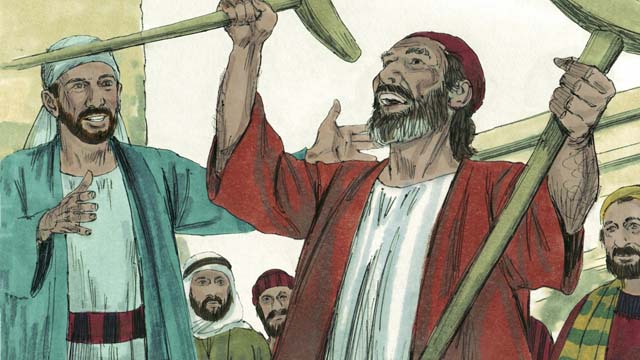
One of the leaders in the early Church was a man named Stephen. He had a good reputation and was full of the Holy Spirit and of wisdom. Stephen did many miracles and reasoned persuasively that people should believe in Jesus.
一天,天使像耶稣门徒之一的腓利显现,告诉他去到迦萨的路上,那里是旷野。当他沿着路走着的时候,腓利看到一个从埃提阿伯来的重要大官坐在车上。圣灵告诉腓利去和那人说话。
Important Terms:
Translation Notes:
- the early Church - That is, "the Church when it first began."
- had a good reputation - This could be translated as, "was thought well of by the people." Some languages might translate this as, "had a good name."
- was full of the Holy Spirit and of wisdom - This could also be translated as, "had power and ability from the Holy Spirit and had much wisdom" or, "was full of the Holy Spirit and was very wise."
- reasoned persuasively that - That is, "gave convincing reasons why."
45-02
Stephen's Arrest [45-02]
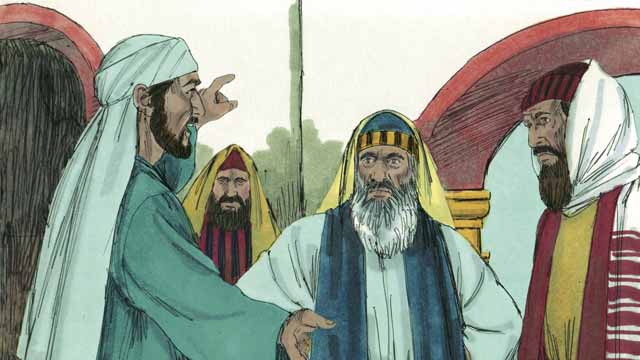
One day, when Stephen was teaching about Jesus, some Jews who did not believe in Jesus began to argue with Stephen. They became very angry and lied about Stephen to the religious leaders. They said, “We heard him speak evil things about Moses and God!” So the religious leaders arrested Stephen and brought him to the high priest and the other leaders of the Jews, where more false witnesses lied about Stephen.
当他靠近车的时候,腓利听见那人在念先知以赛亚的书,他向羊被牵到宰杀之地,他甚至都没有开口。他被不公地屈辱地对待。他的生命从地上夺去。
Important Terms:
Translation Notes:
- One day - This phrase introduces an event that happened in the past, but does not state the specific time. Many languages have a similar way to begin telling a true story.
45-03
You Killed the Messiah [45-03]
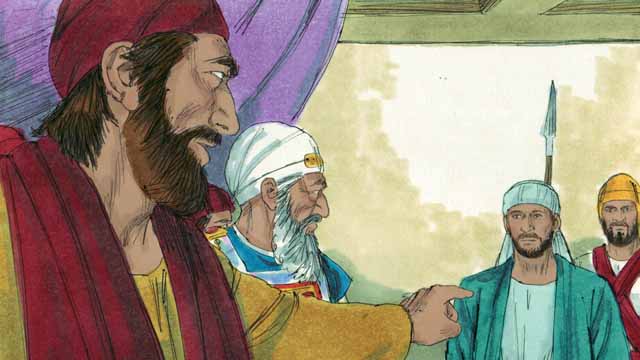
The high priest asked Stephen, “Are these things true?” Stephen replied by reminding them of many of the great things God had done from the time of Abraham to the time of Jesus, and how God's people continually disobeyed him. Then he said, “You stubborn and rebellious people always reject the Holy Spirit, just as your ancestors always rejected God and killed his prophets. But you did something worse than they did! You killed the Messiah!”
腓利问道,你所念的,你明白吗?那人回答道:不知道,以赛亚先知是指着自己说这话的,还是指别人呢?
Important Terms:
Translation Notes:
- Are these things true? - That is, "Are these accusations against you true?" or, "Are the things these people are saying about you true?" or, "Is it true that you said evil things about Moses and God?"
- always reject the Holy Spirit - That is, "never obey the Holy Spirit" or, "always refuse to listen to the Holy Spirit."
- your ancestors - This could be translated as, "your ancestors, the Israelites."
45-04
Stephen Was Stoned [45-04]
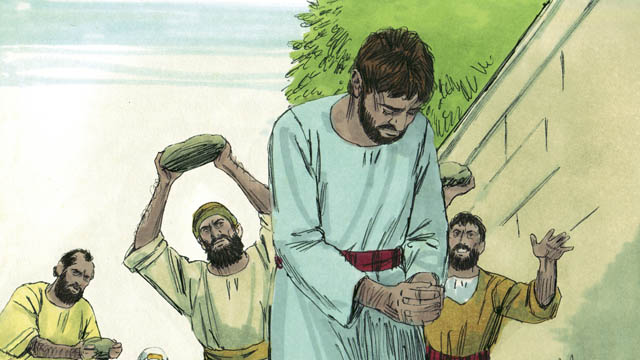
When the religious leaders heard this, they were so angry that they covered their ears and yelled loudly. They dragged Stephen out of the city and threw stones at him in order to kill him.
腓利告诉他以赛亚是指耶稣说这话。腓利也用许多其他经文来向他传耶稣的福音。
Important Terms:
Translation Notes:
- covered their ears - This could also be translated as, "They put their hands over their ears." This was to show that they did not want to hear what Stephen said.
- yelled loudly - They were yelling in anger. Translate this in a way that communicates that they were very upset.
45-05
Stephen's Prayer [45-05]
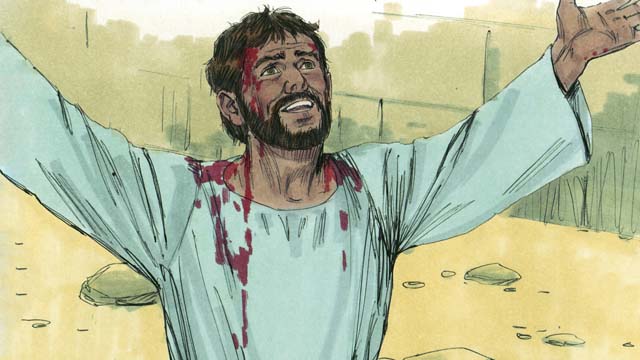
As Stephen was dying, he cried out, “Jesus, receive my spirit.” Then he fell to his knees and cried out again, “Master, do not count this sin against them.” Then he died.
当他们到了有水的地方,太监说:“看!这里有水,我为什么不在这受洗呢?” 于是他吩咐车停下。
Important Terms:
Translation Notes:
- As Stephen was dying - That is, "Just before Stephen died."
- cried out - That is, "called out in a loud voice" or, "said very loudly."
- do no count this sin against them - That is, "do not consider them guilty of the sin of killing me."
45-06
The People Attacked the Believers [45-06]
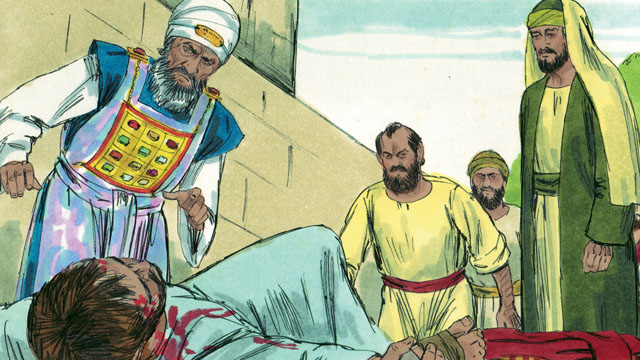
A young man named Saul agreed with the people who killed Stephen and guarded their robes while they threw stones at him. That day, many people in Jerusalem started persecuting the followers of Jesus, so the believers fled to other places. But in spite of this, they preached about Jesus everywhere they went.
因此,他们就下了水,腓利为他施洗。从水里上来后,主的灵把腓利提取了别的地方,继续在各城宣传福音。
Important Terms:
Translation Notes:
- guarded their robes - This could be translated as, "watched over their coats." He was probably making sure they didn't get stolen or damaged.
- But in spite of this - The Jewish leaders thought they could stop the spread of Jesus' teaching by persecuting his followers. Instead, this caused them to scatter and spread the message even more widely.
45-07
Philip on the Desert Road [45-07]
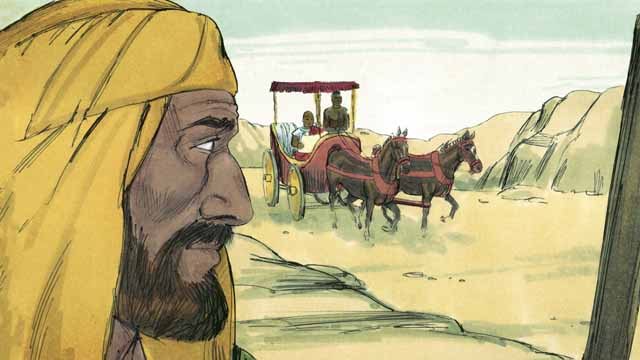
A disciple of Jesus' named Philip was one of the believers who fled from Jerusalem during the persecution. He went to Samaria where he preached about Jesus and many people were saved. Then one day, an angel from God told Philip to go to a certain road in the desert. As he walked along the road, Philip saw an important official from Ethiopia riding in his chariot. The Holy Spirit told Philip to go and talk to this man.
太监继续赶路,但因认识了耶稣而十分喜乐。
故事来源: 使徒行传 8:26-40
Important Terms:
Translation Notes:
- one day - This phrase introduces an event that happened in the past, but does not state the specific time. Many languages have a similar way to begin telling a true story.
- Ethiopia - Ethiopia is a country in Eastern Africa.
45-08
The Ethiopian Read Isaiah [45-08]
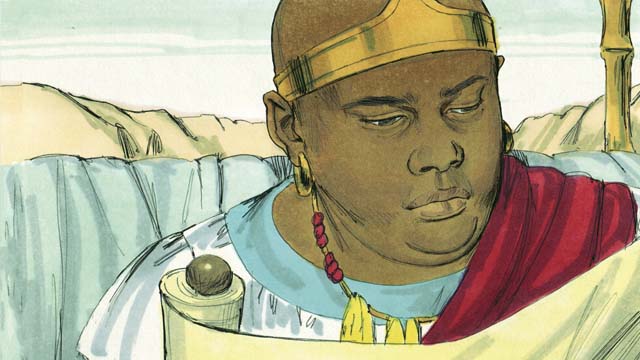
When Philip approached the chariot, he heard the Ethiopian reading from what the prophet Isaiah wrote. The man read, “They led him like a lamb to be killed, and as a lamb is silent, he did not say a word. They treated him unfairly and did not respect him. They took his life away from him.”
NOT TRANSLATED
Important Terms:
Translation Notes:
- Ethiopian - That is, a person from the country of Ethiopia. See note on [[:zh:obs:notes:frames:45-07|[45-07]]].
- approached the chariot - That is, "got close to the chariot" or, "came near to the chariot."
- as a lamb is silent - This could also be translated as, "like a lamb that is silent even when it is about to be killed."
45-09
Philip Met the Ethiopian [45-09]
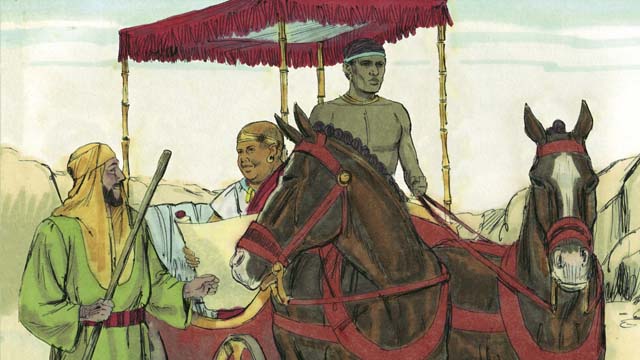
Philip asked the Ethiopian, “Do you understand what you are reading?” The Ethiopian replied, “No. I cannot understand it unless someone explains it to me. Please come and sit next to me. Was Isaiah writing about himself or someone else?”
NOT TRANSLATED
Important Terms:
Translation Notes:
- Was Isaiah writing about - This can also be translated as, "Was Isaiah referring to."
45-10
Philip Preached about Jesus [45-10]
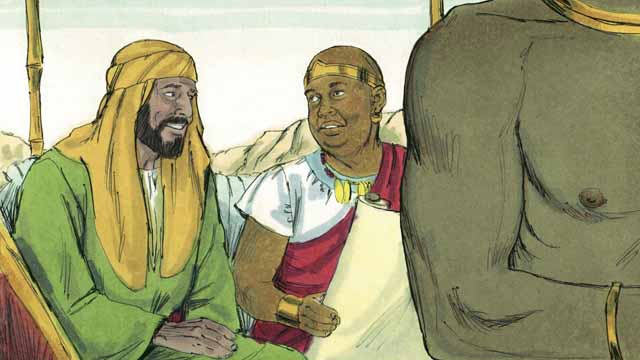
Philip explained to the Ethiopian man that Isaiah was writing about Jesus. Philip also used other scriptures to tell him the good news about Jesus.
NOT TRANSLATED
Important Terms:
Translation Notes:
- (There are no notes for this frame.)
45-11
Here Is Water [45-11]
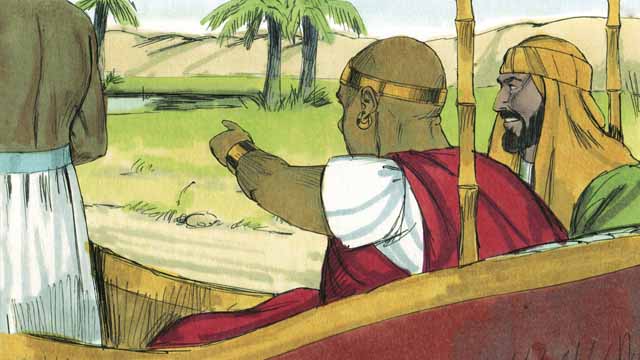
As Philip and the Ethiopian traveled, they came to some water. The Ethiopian said, “Look! There is some water! May I be baptized?” And he told the driver to stop the chariot.
NOT TRANSLATED
Important Terms:
Translation Notes:
- some water - Use a term that means a larger body of water such as a pond, lake, or stream.
- May I be baptized? - This could also be translated as, "Is there any reason that I cannot be baptized?"
45-12
Philip Baptized the Ethiopian [45-12]
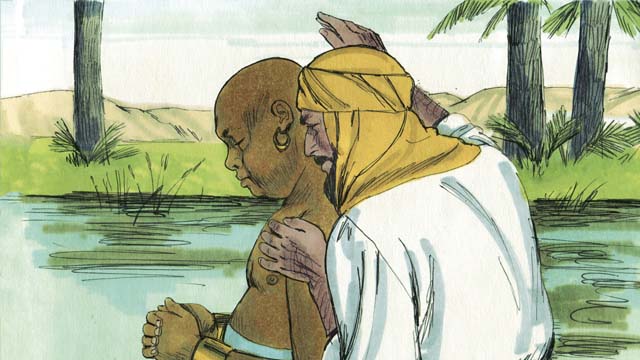
So they went down into the water, and Philip baptized the Ethiopian. After they came up out of the water, the Holy Spirit suddenly carried Philip away to another place where he continued telling people about Jesus.
NOT TRANSLATED
Important Terms:
Translation Notes:
- carried Philip away - That is, "took Philip away" or, "snatched Philip away."
45-13
The Ethiopian Went Home [45-13]
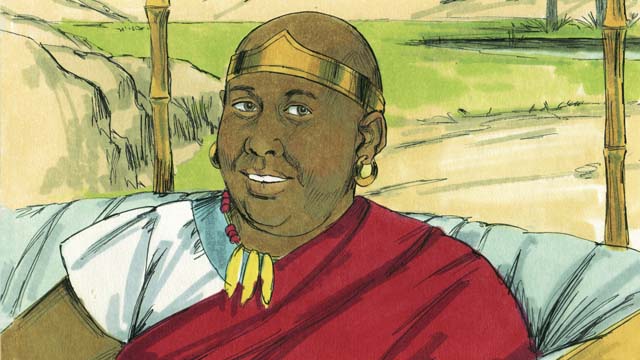
The Ethiopian continued traveling toward his home, happy that he knew Jesus.
NOT TRANSLATED
Important Terms:
Translation Notes:
- A Bible story from - These references may be slightly different in some Bible translations.
